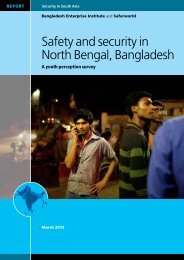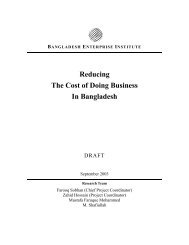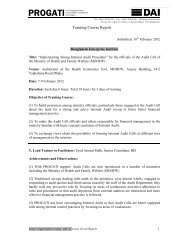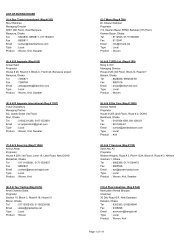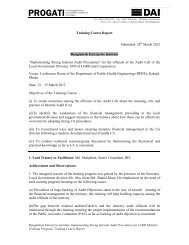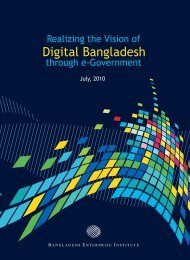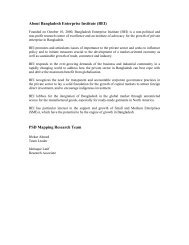Bangladesh Social Enterprise Project - Bangladesh Enterprise Institute
Bangladesh Social Enterprise Project - Bangladesh Enterprise Institute
Bangladesh Social Enterprise Project - Bangladesh Enterprise Institute
You also want an ePaper? Increase the reach of your titles
YUMPU automatically turns print PDFs into web optimized ePapers that Google loves.
able to start and grow at a rate much faster than comparable developing countries. The policy<br />
emphasis should therefore simply be to remove the remaining barriers to social and<br />
conventional entrepreneurship, to ensure that the benefits of growth are delivered to<br />
marginalised people, and to ensure that growth is economically, socially and environmentally<br />
sustainable. The level of private sector activity can probably not grow much faster, what is<br />
required is a greater quality of activity which directly targets equitable and sustainable<br />
economic and social development. <strong>Social</strong> entrepreneurship can significantly contribute to such<br />
an objective.<br />
3.0 The Barriers to <strong>Social</strong> and Conventional Entrepreneurship<br />
Access to credit: Micro‐credit was invented specifically to solve the fundamental market failure<br />
that poor people lack collateral and therefore lack access to loans for investment, locking them<br />
into activities which create little value. Additionally, the transaction costs of making and<br />
securing the repayment of small loans to dispersed customers are typically too high to be<br />
attractive to a conventional bank. Organisations such as BRAC and Grameen have made<br />
significant progress in overcoming these barriers and micro‐credit is now a well‐established<br />
activity. More recently, social entrepreneurs have recognised a “missing middle”‐ the small<br />
enterprises which are too large for conventional micro‐credit but too small for conventional<br />
bank borrowing or issuing equity. Such small enterprises are essential for job creation and<br />
organisations such as BRAC are developing finance products to suit their needs.<br />
Access to other finance products: The growth in credit can be dangerous to individuals if it is<br />
not accompanied by growth in access to other financial products, in particular insurance. Smallscale<br />
entrepreneurs risk facing uninsured risk if they borrow to invest in a business which then<br />
fails through some external problem such as weather or crop failure. Informal village‐level<br />
mutual insurance rarely works as each member of a village typically faces identical risks – for<br />
example a flood in a village would tend to affect each member of a mutual insurance scheme<br />
simultaneously.<br />
Poor people also often lack the ability to save money securely and at a<br />
BSEP: Policy Brief<br />
Page 6




